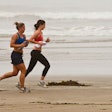In the academy, there was an instructor who taught classes on nutrition and warned us about putting on weight, after eating too many doughnuts. She told us of the pitfalls of joining the "NRA," once we passed probation. This particular NRA was the Never Run Again club.
Avoid looking like you belong to that type of group by paying attention to your health. It isn't just diseases such as heart disease that really hurt women, but also silent health issues we're not aware of. Our chance of being shot and killed as an officer are far less likely than our chance of being killed by a heart attack or dying from the complications of a broken hip when we're older due to a vitamin deficiency.
This leads me to ask, "How are we supposed to know all of this stuff?" We would never dream of hitting the street without ammo in our guns or gas in our tanks, so why do we neglect our bodies?
Most of the time, we have few easily available choices for eating. To deal with my limited food options, I purchased a cooler and packed my own meals for the times when eating at a healthy place wasn't an option.
Don't get stuck grabbing junk food or being desperately hungry and settling for a bad food choice. Having a cooler of good food still isn't a guarantee of getting to eat but at least it's there if you get a chance.
Many women are now experiencing a vitamin D deficiency, and they don't even know they have it. This leads to bone loss and weakness. It also leads to increased risk of cardiovascular disease and cancer. Could this be one of the reasons why heart disease is the number one killer of women in America right now according to the Centers for Disease Control and Prevention (CDC)?
Our bodies are under a lot of stress by carrying around the extra weight of gun belts, ballistic vests and the rest of our gear not to mention the stress of jumping walls and getting in and out of cars all shift long.
Women over 40 should have a bone density test, as well as a blood test to check vitamin D deficiency. Even though vitamin D can be absorbed through the skin, and many officers are outside for eight or more hours a day, sunscreen can prevent absorption. Bone pain and muscle weakness are signs of vitamin D deficiency.
Limited exposure to sunlight can cause vitamin D deficiency. This includes having dark skin, using sunscreen or, as some officers do, wearing long sleeves all year round. Also, if milk and dairy aren't part of your diet—if you follow vegan or vegetarian diets—vitamin D most likely will be severely reduced. While on duty, officers don't usually eat fish and eggs—natural places vitamin D occurs.
Vitamin D is also converted into its active form in the kidneys. Officers who don't regularly get enough water to drink may have more trouble with this because of being in a regular state of dehydration. I've known many officers who have kidney stones. It makes me wonder.
Muscle strength and bone strength go hand in hand. Do yourself a favor and find a medical professional or nutritionist you can trust and make sure you're taking good care of yourself. Ultimately, you're the one who needs to care for your health.




















